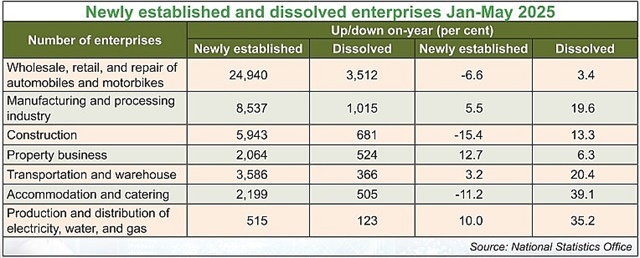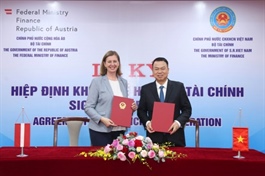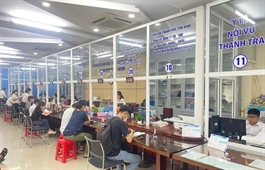Efforts aim to ease enterprise headaches
Efforts aim to ease enterprise headaches
Confidence of businesses in the domestic economy remains feeble, with the government promising to facilitate enterprises to access loans more easily.
Figures released by the National Statistics Office last week showed that in the first five months of 2025, the number of enterprises newly established and resuming operations came in at 111,800, up 11.3 per cent as compared to the same period last year.
This includes nearly 66,800 newly established businesses, up only 0.6 per cent on-year. On average, each month saw nearly 22,400 of enterprises newly founded and resuming operations.
Meanwhile, also in this period, the number of businesses registering to halt performance reached close to 74,600, up 12.8 per cent on-year. This is alongside more than 27,500 enterprises temporarily ceasing operations to wait for implementing dissolution procedures, up 18.3 per cent on-year; and nearly 9,600 businesses completing such procedures, up 15.7 per cent on-year. On average each month, more than 22,300 enterprises left the market.
The total types of these enterprises in the first five months reached 111,700, almost the same as the number of enterprises newly established and resuming operations. Also, the average number of those newly established and resuming operations was also the same as that of those leaving market every month.
“The government is gradually removing difficulties for enterprises and investors. For example, issues with long-delayed projects costing a total of $240 billion and covering more than 200,000 hectares of land are being solved,” stated Prime Minister Pham Minh Chinh. “However, the economy remains in massive difficulties, with production and business activities in many sectors still facing numerous obstructions.”
One of the biggest solutions it offers is to facilitate enterprises to have easier access to credit. In the Vietnamese economy, it is estimated that more than 90 per cent of businesses’ capital is provided by commercial banks, among other channels.
The State Bank of Vietnam has set a target of 16 per cent in credit growth this year, meaning that a sum of about VND2.5 quadrillion ($100 billion) must be inserted into the economy in a form of bank loans.
However, PM Chinh said, efforts are to be made to reach a credit growth rate of more than 16 per cent.
It is estimated that as of May 19, the total credits of the entire banking system reached $659.6 billion, up nearly 6 per cent as compared to the end of 2024, and up 18.67 per cent as compared to the same period last year. Notably, from April 15 to May 19, as much as $10.4 billion worth of credits were provided to enterprises and individuals.
Since early this year, the average lending rate for new transactions at commercial banks sat at 6.34 per cent a year, down 0.6 per cent a year as compared to the end of 2024.
In a governmental resolution enacted a fortnight ago on achieving the desired economic growth goal for the year, the government has asked relevant agencies and ministries to effectively combine policies. The government has placed a big focus on using the monetary policy as a main solution to spur on enterprises’ performance.
“Credit growth must be monitored in line with the economic growth goal and inflation control, with the banking system’s safety ensured, in which banks are to be given quotas on credit growth,” the resolution read. “Credit institutions are to be directed towards production and business activities, prioritised sectors, and feasible key projects and works.”
From now until the year’s end, credit will be closely controlled in risky sectors, and efforts are to be made to reduce lending rates, and cut and simplify lending procedures in order to timely provide credits for projects and sectors acting as the economy’s growth drivers, especially in green growth.
In addition, inspections and examinations and close supervision of credit institutions’ activities are to be tightened, including loaning activities.
“All violators, especially credit institutions with and illegal and unhealthy lending rate competition, must be punished,” the resolution stressed. “A programme worth VND100 trillion ($4 billion) for those engaging in the sector of agro-forestry-fishery is to be actively carried out, and credit institutions are to be directed to offer a preferential credit package to those under the age of 35 to purchase houses.”
In this package, beneficiaries will be entitled to a lending rate of below 2 per cent a year within the first five months, and an annual rate of below 1 per cent over the next 10 years. The maximum period for this incentive is 15 years.
Besides the monetary policy, the government will also expand the fiscal policy to provide more assistance to enterprises.
For example, the 8 per cent VAT rate will continue until at least the end of 2026, valid for many groups of goods and services. In addition, another resolution on extending the time for exempting rental of agricultural land in 2024 will also be passed soon.
Shantanu Chakraborty, country director for Vietnam of the Asian Development Bank (ADB) said, “Extending the VAT reduction until late 2026 is a positive step, but broader measures - such as potential income tax and fee cuts, as well as social spending expansion - could also be considered. In addition, further structural reforms to relieve regulatory burdens for businesses and households will enhance longer-term growth.”
The government has undertaken comprehensive institutional reforms to improve government efficiency and spur growth, Chakraborty added.
“This, we believe, will certainly result in higher and sustainable economic growth if these ongoing, extensive reforms are implemented swiftly and efficiently,” Chakraborty said. “They would present opportunities to stimulate the domestic economy and increase governance efficiency in the near term, and consequently boost private sector development over the medium and long term, thus helping mitigate some of the external risks and uncertainties.”
The ADB forecasted that the Vietnamese economy will grow at 6.6 and 6.5 per cent in 2025 and 2026, respectively.
|
Pham Trong Nghia, National Assembly deputy Lang Son province
Vietnamese enterprises are the core force in building a self-reliant and self-reliant economy. Participating in public projects to benefit from resources and support from the state is an effective solution to improve the capacity of enterprises.
Therefore, it is recommended that the government prioritise domestic enterprises to implement public investment projects, especially large-scale ones on infrastructure such as transportation, technology or energy. I highly appreciate the draft Law on Railways (amended) and Article 11 of the Investment Law for them embracing provisions related to this issue.
Regarding diversifying markets and supply chains. According to a report by the Ministry of Industry and Trade, in 2024, only about 20-30 per cent of Vietnamese enterprises took advantage of incentives from free trade agreements, mainly due to lack of capacity in technology, management and failure in international standards.
Therefore, it is proposed that the government has a programme to support Vietnamese enterprises to make the most of the 16 free trade deals currently being implemented, and to promote trade promotion priorities in newly opened potential markets to support enterprises.
The government should develop a strategy on domestic supply chains to encourage domestic enterprises to participate deeply in key production stages, thereby reducing dependence on foreign supplies.
Mai Van Hai, National Assembly deputy Thanh Hoa province
Currently, there are still some mechanisms and administrative procedures that are slow to be amended and supplemented. Almost every job we carry out has its own problems, and some issues have been delayed for a long time but have yet to be resolved.
There are many problems in implementing public projects and disbursing public investment capital, as well as problems in implementing investment procedures, especially those related to land. Besides that, there are also a lot of problems in granting land use right certificates, and difficulties in site clearance, compensation, support, and resettlement.
To contribute to solving this problem, it is necessary to focus on implementing the resolutions on innovation in lawmaking and enforcement to meet the requirements of national development in the new era.
In which, it is necessary to seriously carry out the direction of the Party General Secretary, the National Assembly Chairman, the Politburo, and the Party Secretariat on innovation in thinking in lawmaking, overcoming the idea that if you cannot manage it, then ban it.
All institutional difficulties must be solved promptly, especially institutional reform that will help the two-level local government apparatus after the merger of localities operate smoothly, effectively, and efficiently, serving the people and businesses well.
- 10:21 25/06/2025




























